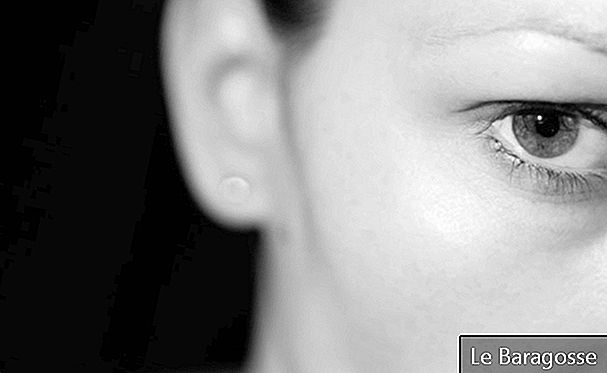
Not many people report feeling anxious about a job interview, a new job or even meeting a special person or a trip.
Celia Lima, a holistic psychotherapy specialist at Personare, comments that it is absolutely normal to be anxious in certain situations. Fear, expectation and doubt are feelings that trigger anxiety. It arises at times or even a few days before major events.
“A person may be anxious waiting for a test result, health check, before a love or professional encounter, in the line of a roller coaster, waiting for the start of a show of his favorite band as he walks down a dark and crowded street. many other facts of life that she thinks are important or threatening. That is, can anxiety be present in the face of facts that promote excitement ?, Celia exemplifies.
But, as the expert points out, there are other types of anxiety that end up compromising the life of the individual, making a healthy social and family life impracticable, and making his life a marathon of emotional ups and downs, which cause constant suffering.
According to clinical psychologist Cristiane Maluhy Gebara, anxiety disorders affect around 25% of the population, with the highest incidence being in women.
Read also: 12 Things Only Anxious People Understand
Symptoms that virtually every anxious person feels

Clinical psychologist Cristiane stresses that feeling anxious or afraid when facing a stressful situation is normal. However, anxiety becomes pathological when it brings some typical emotional and physical symptoms, causing damage in various areas of life.
Among the symptoms most commonly found in anxiety disorders, professionals Celia and Cristiane highlight:
The main emotional symptoms:
- Excessive concern;
- Nervousness;
- Insecurity;
- Irritability;
- Lack of concentration;
- Insomnia;
- Fears;
- Anguish;
- Isolation.
The main physical symptoms:
- Dizziness;
- Tachycardia;
- Sweating;
- Shortness of breath;
- Tremor;
- Muscle tension;
- Headaches;
- Body pain;
- Gases;
- Intestinal cramps.
Some questions you can ask yourself to assess whether anxiety actually impairs your quality of life in one way or another are:
Read also: 5 activities that improve quality of life
- Are you constantly tense and worried about something (s)?
- Has your anxiety ever disturbed anything that was your responsibility? How, for example, submitting a job at school or college?
- Do you constantly feel tormented by fears that most people explain to you that are irrational?
- Do you believe that something bad will happen if certain things are not done in a certain way?
- Do you avoid some everyday situations or activities because they cause you anxiety?
- Do you feel that dangerous and catastrophic situations are around the corner and / or can happen at any time?
- Do you often have difficulty falling asleep as you find yourself thinking about all you have to do the next day?
- Do you have difficulty focusing on a single activity?
- Do you rush into situations? For example, when you are going to have a serious conversation with someone, do you ever wonder what you are going to say and what they are likely to answer?
If you answered yes? For several of these issues, you may be suffering from an anxiety disorder. But, of course, this is no cause for despair, after all, only a professional can evaluate your case and, if necessary, indicate the best treatment.
The types of anxiety and how they differ

Below you understand a little more about the different anxiety types / frameworks:
Generalized Anxiety Disorder (GAD)
Celia explains that the person can not maintain control over their mood, is constantly worried and apprehensive and starts to have symptoms such as difficulty concentrating, tiredness, muscle tension, irritability, restless and choppy sleep. Other symptoms may include shortness of breath, nausea, chest tightness, bowel disorders, headaches, excessive sweating, changes in blood pressure and tachycardia. This we call Generalized Anxiety Disorder, which affects people of all ages, including children ?, he says.
It is natural that we have doubts in certain life situations about our performance in certain tasks as much as it is normal to be worried when we lose our job.Sometimes we may lose sleep because we are apprehensive awaiting the arrival of a child from the club or because we need to wake up early and are afraid of missing the time. There are numerous everyday events that can trigger anxiety, yet they cease when the issue is resolved. But when worry is disproportionate to the event, when we begin to fantasize about catastrophes, accidents, or irreversible situations and these feelings linger for more than six months without ceasing, can we say that TAG is in place and is the time to seek professional help? , highlights the expert.
"It is essential that a clinical evaluation be made, as some symptoms alone do not necessarily point to an anxiety disorder," says Celia.
But what are the conditions for the onset of this type of disorder? In addition to physical / hormonal disorders such as the arrival of menopause, thyroid problems or heart problems, traumatic psychological issues can trigger GAD. Having witnessed or even been a victim of violent events or being dependent on substances such as alcohol, cigarettes and drugs in general can lead the individual to develop the disease ?, explains the expert.
It is not uncommon, according to Celia, that GAD is present along with other problems such as phobias, panic, depression, posttraumatic stress disorder, obsessive compulsive disorder, social anxiety disorder or social phobia, and many others.
Social phobia
It can be summed up as an overwhelming concern with everyday social situations when one feels that one can be observed / analyzed by others. She is then insecure, worried about what they might think of her.
? We can talk about the fear of public speaking that characterizes anxiety about one's own performance. If it is natural for everyone to feel a little anxious when they need to make an explanation or to give a lecture, in social phobics this happens with uncontrollable intensity, causing suffering. The fear of being judged is very paralyzing and, consequently, disabling ?, highlights Celia.
Similarly, the excessive shyness that causes the person to withdraw does not want to participate in ordinary social activities, has no friends and does not relate affectionately. These are cases that call for research and treatment, as well as other types of phobia ?, adds the expert.
Agoraphobia
Agoraphobia can be summed up as the fear of crowded places. You may also be afraid to walk the streets, the difficulty of leaving home alone, going to certain places (such as markets or cinema), because you inexplicably feel the need to have someone next to you to give you security.
Some common fears are: being away from home or safe people; riding a car, bus or plane alone; situations where exit is difficult such as congestion, stadiums; lifts etc.
Specific Phobias
These are those related to intense fears of a specific object or situation, such as snakes, insects, height, plane, thunder, etc. The detail is that the level of this fear is generally inadequate and can lead the person to avoid everyday situations, interfering with their quality of life.
Celia points out that the causes of phobias may be related to traumatic events, but there is not always an apparent cause. "Which makes one think there may be genetic factors that lead to intense and persistent fear for no rational reason," he says.
Panic disorder
It is a type of anxiety disorder in which unexpected bouts of despair occur and an intense fear that something bad will happen (even if there is no reason / danger signs).
It may be accompanied, for example, by agoraphobia, which is the fear of being in places where help would be difficult in the event of a panic attack.
Obsessive-compulsive disorder
According to Celia, Obsessive Compulsive Disorder (OCD) is characterized by the belief that if they don't do something in a certain way, something terrible can happen. And, until the ritual of checking (checking repeatedly if the door is locked, for example), hygiene (washing your hands each time you touch something), symmetry (minding the exact position of certain objects) is fulfilled, the state of anxiety does not stop ?, he says.
Although perfectionism is often mistaken for OCD, it is associated with a neurotic disorder rather than an anxiety disorder. The perfectionist tolerates neither his mistakes (introspective perfectionism) nor those of others (extrospective perfectionism). She does and does a job because she strives for perfection, unlike the OCD sufferer who governs her behavior based on a belief?
Post Traumatic Stress Disorder
"Is it characterized by a series of symptoms that arise after days, months or even years after an event involving violence or any episode that has endangered the life of the victim or someone else, such as a natural disaster?" , highlights Celia.
Flashbacks of the situation, nightmares, and memories can arise so intense that the person relives the situation as if he was going through everything again at that moment, causing all the physical and emotional symptoms such as tachycardia, sweating, and dizziness. Over time the person may want to avoid social situations that can revive trauma ?, explains the expert.
Insecurity
Insecurity also generates anxiety, as Celia explains.Not knowing exactly what to do in most circumstances, relying excessively on others' opinions to make a decision, constantly doubting one's ability to solve problems, being afraid of disappointing people, being afraid of disappointment, are some of the factors that promote the isolation of the person.
Often, as a defense mechanism against insecurity, controlling or aggressive behavior can develop. The overly insecure person has doubts about whether or not doing the right thing and, never getting a satisfactory answer, ends up paralyzing or acting on impulse just to get rid of the anxiety generated by anxiety ?, highlights the expert.
How is anxiety diagnosed?

Cristiane points out that an anxiety disorder is diagnosed by a psychiatrist and is done clinically. There is no laboratory test to diagnose the problem.
Celia explains that it is important to remember that everyone experiences normal and healthy episodes of fear, anxiety and apprehension. ÜAnd we are all subject to occasionally having a sleepless night. Feeling fear can protect us from everyday dangers, anxiety over some facts is natural, as it is normal to be nervous before or during an interview, and all these feelings can trigger physical symptoms such as dizziness or pain. Of Head. You must have several symptoms associated and for a considerable time to begin to suspect some kind of anxiety disorder. Consulting a professional is essential to make the diagnosis accurate and to define an appropriate treatment that returns the individual to a productive and emotionally healthy life ?, he says.
Treatments for Anxiety Disorders
Each case is unique and should be evaluated by a qualified professional. "The right treatments, with cognitive behavioral therapy and often with medication, can help the person to remedy the symptoms," says Cristiane.
Cognitive behavioral therapy basically aims to propose changes in behaviors of the person through cognitive restructuring, that is, modifying beliefs, ways of interpreting negative situations by others more based on reality.
Ideally, upon noticing the frequent presence of symptoms associated with anxiety, the person seeks a professional who will indicate the best treatment (whether drug or not).
7 Measures to Reduce Anxiety
Cristiane explains that, to prevent anxiety attacks, it is important to strike a balance in several ways:
- Do physical activity.
- Have a good diet.
- Acquire hobbies.
- Live with family and friends.
- Try to do pleasant things in your free time.
- To relax.
- Work with the thoughts.
Anxiety Questions and Answers

Check out the clarification for the main questions related to anxiety disorder:
1. Can anxiety lead to depression?
?Not necessarily. But can depression be associated with some anxiety disorder, says Cristiane.
Yes, there are similar symptoms in depression and anxiety, such as fears, difficulty concentrating, insecurity, irritability, among others. However, they are different pictures. What is important to note is that both are diseases and must be diagnosed and treated correctly, each in its own way, by specialized professionals.
2. What should I do during an anxiety attack?
In the face of an anxiety crisis it is important not to deny what you are feeling. Take a deep breath and let it out slowly and bring in thoughts like "will I calm down and find a solution to the problem?" It is of the utmost importance. Bringing more functional thoughts eases anxiety. Relaxation and meditation techniques can also be adopted, but it is worth the reminder that there must be constancy and training ?, highlights Cristiane.
3. What not to say to a person who has anxiety?
The clinical psychologist explains that it is very bad to tell the person that she is not feeling anything or that it is "rubbing". The symptoms will get worse.
4. Is it true that some antidepressants cause addiction?
Not true, according to Cristiane. This type of medication, of course, should only be taken if medically indicated and always following the professional's advice (ie following the treatment correctly).
5. How to help a person who has signs of anxiety?
First of all we need to listen to it and be continent. Another step would be to have it breathe in and slowly let it out through your mouth a few times and pay attention to the path the air takes. This is diaphragmatic breathing. With training, it is possible to achieve a physical and mental balance ?, highlights Cristiane.
"Another important step is to help her bring more functional and more realistic thoughts, because when anxiety is intense, thoughts are often catastrophic," explains the psychologist.
6. Can I get anxiety treatment even though I am pregnant?
Yes, according to Cristiane."Cognitive behavioral therapy is very effective for anxiety disorders," he says.
7. Can children also suffer from the disorder?
?Yes. Can they benefit greatly from cognitive behavioral therapy? Explains Cristiane.
8. What are the pros and cons of antidepressant medications?
• When there is a diagnosis of a mental disorder and some medication needs to be taken, it is common that in some cases side effects appear early, however, after a few days, these side effects tend to disappear and the symptoms will be remedied. ? says Cristiane.
I often tell my patients, "Why is it easier when we have a diagnosis of hypothyroidism, for example, to accept that we have to take a medication daily?" Why not accept this fact when it comes to a mental disorder ???, adds the psychologist.
Now you know: feeling anxious and even afraid of some situations is extremely normal. The problem happens when the person spends the day full of worries and exaggerated tensions, even if there is little or nothing causing it. When you anticipate disasters, problems, etc. These, among other symptoms, may indeed be indicating an anxiety disorder, which should be diagnosed and treated by qualified professionals.
Is anxiety a sin? (April 2024)
- Prevention and Treatment
- 1,230
















